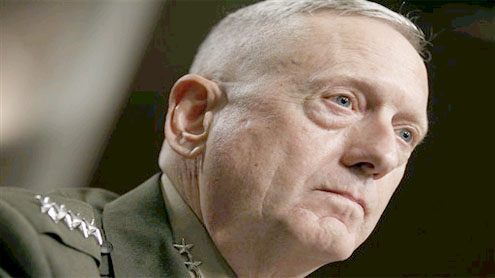 WASHINGTON: The top US commander in the Middle East said on Tuesday he will travel to Pakistan in about 10 days to talk with leaders about reopening ground supply routes that have been closed since late November, reported Washington Post, quoting an American news agency.
WASHINGTON: The top US commander in the Middle East said on Tuesday he will travel to Pakistan in about 10 days to talk with leaders about reopening ground supply routes that have been closed since late November, reported Washington Post, quoting an American news agency.
General James Mattis, commander of US Central Command, told the Senate Armed Services Committee that the US needs those supply routes to facilitate the withdrawal of US troops from Afghanistan.Pakistan shut down the supply routes in an uproar over US airstrikes that killed 24 Pakistani soldiers in an exchange of fire at the Afghanistan border on Nov 26.US officials have worked to try and repair the tattered relations with Islamabad.
Pakistan has rebuffed any US military visits since the airstrikes, and Islamabad’s parliament is working out new guidelines to define the US-Pakistan alliance.Mattis also told legislators despite a recent wave of murders of US servicemembers by Afghan security forces, the United States will stick with its strategy based on battlefield partnership between troops from the two nations.Gen Mattis said that most Afghan troops have maintained discipline during a wave of public anger following the burning of Qurans by US troops.
“Even their performance during the last two weeks – disciplined, restrained, standing by us – is an indication that this is a force that has come a long way,” he said. There will still be stumbles, said Mattis, who appeared with Adm William McRaven, commander of US Special Operations Command.The United States is on track to end its combat role in December 2014, he said. The goal of having 352,000 Afghan security troops in service will be reached this spring, months ahead of schedule, he said.
Brewing conflicts in the Middle East dominated much of the hearing, with Arizona Senator John McCain repeating his call for an attack on Syria, saying that assisting the Syrian opposition with supplies and logistics won’t do the job. “The only realistic way to do it is foreign air power, and the time has come for it,” McCain said.He appeared to grow irritated after Mattis said he believed Al Qaeda was operating within the Syrian resistance. “You know what that flies in the face of, general?” McCain said. “People who yearn for liberty and not living under an oppressive, brutal dictatorship.”
Mattis said stopping the Syrian regime’s violence would require international cooperation.Mattis also told legislators that Al-Qaeda is beginning to make a comeback in Iraq in the wake of the US pullout, and beginning to make its presence felt in Baghdad.McRaven told legislators special operations forces are operating in about 78 countries worldwide, with about 80 per cent of the deployed force in Central Command.
Mattis said possible military intervention against the regime in Syria would be ‘extremely challenging’ given the country’s advanced air defences.Syria has Russian-made missiles and radars that would complicate any outside effort to use air power to protect civilians or resistance forces, General James Mattis, head of US Central Command, told the committee.“The Russians have provided very advanced integrated air defence capabilities – missiles, radars, that sort of thing – that would make imposition of any no-fly zone challenging if we were to go that direction,” Mattis added. – Nation












